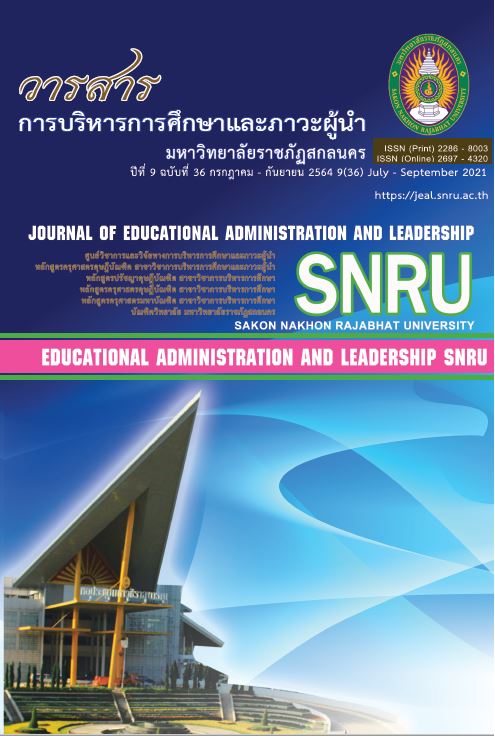

ภาวะผู้นำทางวิชาการของผู้บริหารโรงเรียนที่ส่งผลต่อผลสำเร็จในการดำเนินการประกันคุณภาพภายในโรงเรียน สังกัดสำนักงานเขตพื้นที่การศึกษาประถมศึกษานครพนม เขต 2
Instructional Leadership of School Administrators Affecting of Internal Quality Assurance in Schools Under the Nakhon Phanom Primary Educational Service Area Office 2
ผู้แต่ง
ข้าวทิพย์ ทีสุกะ, ศิกานต์ เพียรธัญญกรณ์, ชรินดา พิมพบุตร
Author
Khaowthip Teesuka, Sikan Pienthunyakorn, Charinda Pimpabud
บทคัดย่อ
การวิจัยครั้งนี้มีความมุ่งหมายเพื่อศึกษา เปรียบเทียบ หาความสัมพันธ์ หาอำนาจพยากรณ์ของภาวะผู้นำทางวิชาการของผู้บริหารโรงเรียนที่ส่งผลต่อผลสำเร็จในการดำเนินการประกันคุณภาพภายในโรงเรียน และหาแนวทางพัฒนาภาวะผู้นำทางวิชาการของผู้บริหารโรงเรียน สังกัดสำนักงานเขตพื้นที่การศึกษาประถมศึกษานครพนม เขต 2 กลุ่มตัวอย่างที่ใช้ในการวิจัย ได้แก่ ผู้บริหารโรงเรียน และครูผู้สอน สังกัดสำนักงานเขตพื้นที่การศึกษาประถมศึกษานครพนม เขต 2 ปีการศึกษา 2562 จำนวน 348 คน จำแนกเป็นผู้บริหารโรงเรียน 93 คน และครูผู้สอน 255 คน โดยใช้ตารางกำหนดขนาดกลุ่มตัวอย่างของ Krejcie and Morgan และใช้วิธีสุ่มแบบหลายขั้นตอน (Multi – Stage Random Sampling) เครื่องมือที่ใช้ในการเก็บรวบรวมข้อมูลเป็นแบบสอบถามมาตราส่วนประมาณค่า 5 ระดับ ประกอบด้วย แบบสอบถามภาวะผู้นำทางวิชาการของผู้บริหารโรงเรียน มีค่าอำนาจจำแนก 0.333 - 0.930 มีค่าความเชื่อมั่นทั้งฉบับเท่ากับ .980 และแบบสอบถามผลสำเร็จในการดำเนินการประกันคุณภาพภายในโรงเรียน มีค่าอำนาจจำแนก 0.457 - 0.939 มีค่าความเชื่อมั่นทั้งฉบับเท่ากับ .985 สถิติที่ใช้ในการวิเคราะห์ข้อมูล ได้แก่ ความถี่ ร้อยละ ค่าเฉลี่ย ส่วนเบี่ยงเบนมาตรฐาน การทดสอบ t-test ชนิด Independent samples การวิเคราะห์ความแปรปรวนทางเดียว (One - Way ANOVA) การวิเคราะห์ค่าสัมประสิทธิ์สหสัมพันธ์อย่างง่ายของเพียร์สัน (Pearson’s Product Moment Correlation) และการวิเคราะห์การถดถอยพหุคูณแต่ละขั้นตอน (Stepwise Multiple Regression analysis)
ผลการวิจัย พบว่า
1. ภาวะผู้นำทางวิชาการของผู้บริหารโรงเรียนและผลสำเร็จในการดำเนินการประกันคุณภาพภายในโรงเรียน ตามความคิดเห็นของผู้บริหารโรงเรียนและครูผู้สอน โดยรวมอยู่ในระดับมาก
2. ภาวะผู้นำทางวิชาการของผู้บริหารโรงเรียน และผลสำเร็จในการดำเนินการประกันคุณภาพภายในโรงเรียน ตามความคิดเห็นของผู้บริหารโรงเรียนและครูผู้สอน จำแนกตามสถานภาพการดำรงตำแหน่ง พบว่าโดยรวม และรายด้าน ทุกด้านแตกต่างกันอย่างมีนัยสำคัญทางสถิติที่ระดับ .01 โดยผู้บริหารมีความคิดเห็นมากกว่าครูผู้สอน
3. ภาวะผู้นำทางวิชาการของผู้บริหารโรงเรียนและผลสำเร็จในการดำเนินการประกันคุณภาพภายในโรงเรียน จำแนกตามขนาดของโรงเรียนและประสบการณ์ในตำแหน่งที่ต่างกัน พบว่า โดยรวมและรายด้านไม่แตกต่างกัน
4. ภาวะผู้นำทางวิชาการของผู้บริหารโรงเรียนกับผลสำเร็จในการดำเนินการประกันคุณภาพภายในโรงเรียน มีความสัมพันธ์กันในทางบวกอย่างมีนัยสำคัญทางสถิติที่ระดับ .01 โดยมีความสัมพันธ์อยู่ในระดับสูง (r = 0.871)
5. ภาวะผู้นำทางวิชาการของผู้บริหารโรงเรียน มีจำนวน 4 ด้าน ที่สามารถพยากรณ์ผลสำเร็จในการดำเนินการประกันคุณภาพภายในโรงเรียน ได้อย่างมีนัยสำคัญทางสถิติที่ระดับ .01 ได้แก่ ด้านการนิเทศ กำกับ ติดตามและประเมินผลการจัดการเรียนการสอน (X6) ด้านการพัฒนานักเรียน (X3) ด้านการบริหารหลักสูตรและการจัดการเรียนการสอน (X2) และด้านการสร้างบรรยากาศที่เอื้อต่อการเรียนรู้ของผู้เรียน (X5) โดยมีอำนาจพยากรณ์ร้อยละ 77.50 และมีค่าความคลาดเคลื่อนมาตรฐานของการพยากรณ์เท่ากับ ±.21886
6. แนวทางพัฒนาภาวะผู้นำทางวิชาการของผู้บริหารโรงเรียน ดังนี้ ด้านการนิเทศ กำกับ ติดตามและประเมินผลการจัดการเรียนการสอน คือ ผู้บริหารและครูผู้สอนควรวางแผนในการนิเทศร่วมกันและมีการสรุปผลการนิเทศ เพื่อดำเนินการปรับปรุงแก้ไขต่อไป ด้านการพัฒนาผู้เรียน คือ ทุกฝ่ายวางแผนร่วมกันพัฒนาผู้เรียน และมีแผนการดำเนินงานที่ชัดเจน ด้านการบริหารหลักสูตรและการจัดการเรียนการสอน คือ ผู้บริหารโรงเรียนให้คำปรึกษาที่ชัดเจนให้ข้อเสนอแนะเพื่อปรับปรุงการสอนของครูอย่างต่อเนื่อง และด้านการสร้างบรรยากาศที่เอื้อต่อการเรียนรู้ของผู้เรียน คือ ผู้บริหารมีการส่งเสริมบรรยากาศทางการเรียนรู้ที่ดี
Abstract
The purposes of this research were to examine, compare, determine the relationship, identify the predictive power, and establish the guidelines for developing school administrators’ instructional leadership affecting the success of internal quality assurance in schools under the Nakhon Phanom Primary Education Service Area Office 2. The sample group, obtained through multi-stage random sampling, consisted of 93 school administrators, and 255 teachers under the Nakhon Phanom Primary Educational Service Area Office 2 in the academic year 2019, yielding a total of 348 participants. The Krejcie and Morgan table was applied for determining sample size. The tools for data collection were two sets of five-point scale questionnaires, comprising a set of questionnaires on instructional leadership of school administrators with the discriminative power values ranging from 0.333 to 0.930 and a reliability of 0.980, and a set of questionnaires on the success of internal school quality assurance with the discriminative power values ranging from 0.457 to 0.939 and a reliability of .985. Statistics for data analysis were frequency, percentage, mean, standard deviation, t-test for Independent Samples, One-Way ANOVA, Pearson’s Product Moment Correlation, and Stepwise Multiple Regression Analysis.
The findings were as follows:
1. The instructional leadership of school administrators and the success of internal quality assurance as perceived by participants as a whole was at a high level.
2. The instructional leadership of school administrators and the success of internal quality assurance as perceived by participants, classified by positions, as a whole and in each aspect were different at the .01 level of significance. School administrators reported opinions more than teachers.
3. The instructional leadership of school administrators and the success of internal quality assurance as perceived by participants, classified by school sizes, and different levels of position experience, as a whole and in each aspect were not different.
4. The instructional leadership of school administrators and the success of internal quality assurance had a positive relationship at a high level (r = 0.871) with the .01 level of significance.
5. The four aspects of school administrators’ instructional leadership consisted of supervision, monitoring, follow-up, and evaluation of teaching and learning; student development; curriculum and teaching and learning management; and conducive learning environment, with the predictive power of 77.50 percent and the standard error of prediction at ±.21886.
6. Guidelines for developing school administrators’ instructional leadership affecting the success of internal quality assurance in schools were listed in the following aspects: In terms of supervision, follow-up, monitoring and evaluation of teaching and learning, school administrators and teachers should create collaborative supervision plans and a summary for further revision. In terms of student development, all of the school divisions should plan together with regard to student development and establish clear operational plans. In terms of curriculum and teaching and learning management, school administrators should provide effective guidance, and suggestions for improving teachers’ instruction continuously, and in terms of conducive learning environment, school administrators should support good learning environment
คำสำคัญ
ภาวะผู้นำทางวิชาการ, ประกันคุณภาพภายในโรงเรียนKeyword
Instructional Leadership, School Internal Quality AssuranceNotice: Undefined variable: dataSet in /var/www/html/ArticleView.php on line 116
Notice: Trying to access array offset on value of type null in /var/www/html/ArticleView.php on line 116
บทความทุกบทความเป็นลิขสิทธิ์ของ
Notice: Undefined variable: dataSet in /var/www/html/ArticleView.php on line 116
Notice: Trying to access array offset on value of type null in /var/www/html/ArticleView.php on line 116
เท่านั้น
กำลังออนไลน์: 11
วันนี้: 38
เมื่อวานนี้: 2,282
จำนวนครั้งการเข้าชม: 1,259,641
อาคารบัณฑิตวิทยาลัย ชั้น 2 ตำบลธาตุเชิงชุม อำเภอเมือง จังหวัดสกลนคร 47000
โทร/
แฟกซ์ 0-4297-0093
บรรณาธิการ: รองศาสตราจารย์ ดร.ไชยา ภาวะบุตร
ติดต่อ/สอบถาม: นายธีรเวทย์ เพียรธัญญกรณ์
โทร: 0-4297-0093